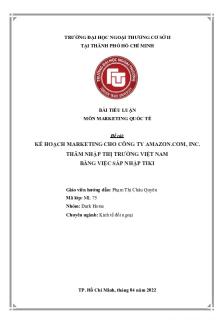Second-language acquisition DOCX

| Title | Second-language acquisition |
|---|---|
| Author | H. Evangelizacao |
| Pages | 1 |
| File Size | 61.3 KB |
| File Type | DOCX |
| Total Downloads | 142 |
| Total Views | 556 |
Summary
Second-language acquisition From Wikipedia, the free encyclopedia Second-language acquisition, second-language learning, or L2 acquisition, is the process by which people learn a second language. Second-language acquisition (often abbreviated to SLA) also refers to the scientific discipline devoted ...
Description
Second-language acquisition From Wikipedia, the free encyclopedia Second-language acquisition, second-language learning, or L2 acquisition, is the process by which people learn a second language. Second-language acquisition (often abbreviated to SLA) also refers to the scientific discipline devoted to studying that process. Second language refers to any language learned in addition to a person's first language; although the concept is named second-language acquisition, it can also incorporate the learning of third, fourth, or subsequent languages.[1] Second-language acquisition refers to what learners do; it does not refer to practices in language teaching, although teaching can affect acquisition. Outline The academic discipline of second-language acquisition is a subdiscipline of applied linguistics. It is broad-based and relatively new. As well as the various branches of linguistics, second- language acquisition is also closely related to psychology, cognitive psychology, and education. To separate the academic discipline from the learning process itself, the terms second-language acquisition research, second-language studies, and second-language acquisition studies are also used. SLA research began as an interdisciplinary field, and because of this it is difficult to identify a precise starting date.[2] However, two papers in particular are seen as instrumental to the development of the modern study of SLA: Pit Corder's 1967 essay The Significance of Learners' Errors, and Larry Selinker's 1972 article Interlanguage.[3] The field saw a great deal of development in the following decades.[2] Since the 1980s, second-language acquisition has been studied from a variety of disciplinary perspectives, and theoretical perspectives. Significant approaches in the field today are: systemic functional linguistics, sociocultural theory, cognitive linguistics, Noam Chomsky's universal grammar, skill acquisition theory and connectionism.[3]...
Similar Free PDFs

Original Acquisition
- 5 Pages

After Acquisition - Business Com
- 4 Pages

Acquisition and Extinction
- 4 Pages

BUSINESS COMBI - ACQUISITION
- 5 Pages

Land acquisition notes
- 49 Pages

Consolidation at Acquisition
- 21 Pages

Consolidation, fusion, acquisition
- 92 Pages

Skill Acquisition Program
- 7 Pages

Second-language acquisition
- 1 Pages

Land Acquisition Case Summary
- 7 Pages

Project on merger and acquisition
- 44 Pages

Merger and Acquisition MBA-converted
- 102 Pages
Popular Institutions
- Tinajero National High School - Annex
- Politeknik Caltex Riau
- Yokohama City University
- SGT University
- University of Al-Qadisiyah
- Divine Word College of Vigan
- Techniek College Rotterdam
- Universidade de Santiago
- Universiti Teknologi MARA Cawangan Johor Kampus Pasir Gudang
- Poltekkes Kemenkes Yogyakarta
- Baguio City National High School
- Colegio san marcos
- preparatoria uno
- Centro de Bachillerato Tecnológico Industrial y de Servicios No. 107
- Dalian Maritime University
- Quang Trung Secondary School
- Colegio Tecnológico en Informática
- Corporación Regional de Educación Superior
- Grupo CEDVA
- Dar Al Uloom University
- Centro de Estudios Preuniversitarios de la Universidad Nacional de Ingeniería
- 上智大学
- Aakash International School, Nuna Majara
- San Felipe Neri Catholic School
- Kang Chiao International School - New Taipei City
- Misamis Occidental National High School
- Institución Educativa Escuela Normal Juan Ladrilleros
- Kolehiyo ng Pantukan
- Batanes State College
- Instituto Continental
- Sekolah Menengah Kejuruan Kesehatan Kaltara (Tarakan)
- Colegio de La Inmaculada Concepcion - Cebu



